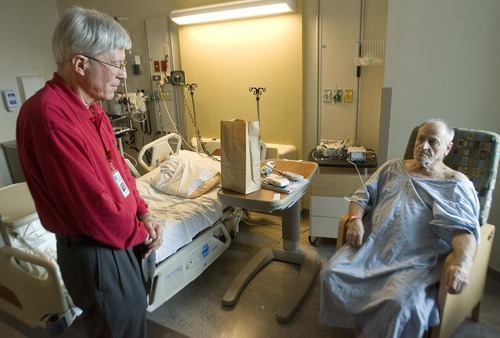This is an archived article that was published on sltrib.com in 2011, and information in the article may be outdated. It is provided only for personal research purposes and may not be reprinted.
A hospital stay accompanied by noise, light and interrupted sleep in unfamiliar surroundings can be a weird experience for anyone but particularly for elderly people, who may drift into delirium.
The condition can lead to hallucinations or overt confusion; a patient may be depressed or withdrawn. Those symptoms come and go. Delirium may be a sign of infection. But in any event, for the sake of patients, it needs to be avoided, doctors say.
A new effort at the University of Utah School of Medicine's geriatrics division has mobilized volunteers for the Hospital Elder Life Program to prevent delirium in elderly patients by keeping their minds and bodies as active as possible.
It's one way the school is responding to the current age wave — by 2030, 78 million U.S. citizens will be 65 or older — and its effect on health care, said physician Mark Supiano, the University of Utah's Center on Aging executive director and chief of the Veterans Administration division of geriatrics.
A third of patients age 70 and older may become delirious during a hospital stay, said Supiano, an internal medicine professor at the medical school.
"It's very easy to become disoriented without cues from the outside world," he said. "When patients experience delirium, it complicates their recovery, prolongs their hospital stays and increases costs."
U. geriatrician Katherine Anderson is the program's supervising physician; Heidi Britton, who recently earned a master's degree in gerontology, runs the program and trains the volunteers, many of whom are over 60. She now has 19 active volunteers and is looking for more, she said.
Salt Lake City resident Bill Kleinschmidt was among the first 11 volunteers trained in July. He commits to three-hour shifts to assist geriatric patients nurses have flagged as being susceptible to delirium within 48 hours.
They may be in the hospital after a fall or a surgery, may have an illness or be recovering from a heart attack. Immobility, sedatives and dehydration can contribute to delirium, which in turn can interfere with a patient's physical therapy. They can't be sent home if they have this unsafe condition, and most nursing homes won't accept patients who are actively delirious.
On a typical shift, Kleinschmidt, who retired two years ago from a long career, introduces himself to patients, tells them about the program's aims and then chats them up.
He offers the patients tubes of lip balm and a soft rubber stress ball to squish. He reminds the patients of the date, asks them if they need anything — glasses, hearing aids, a drink of water, help with eating, a game of cards, a walk. He may read them the newspaper. He knows a bit about their interests from intake sheets the nurses prepare, so he can talk about the patient's former jobs, hobbies or military service.
Britton said Kleinschmidt once got a patient laughing loud enough to be heard up and down the hallways.
Mostly, he just hangs out, a reassuring presence during a stressful time.
"I don't do anything medical at all," Kleinschmidt said. "I'm there to socialize with them, to keep them cognizant."
Supiano said in the program's first six months, the rate of delirium occurrence in older patients at University Hospital has been reduced by almost half — from 33 percent to 17 percent.
"This shows the potential impact that just one innovative change can have on health care for older patients," he said. —
The Hospital Elder Life Program
I Volunteers keep patients age 70 and older attuned to their surroundings, helping their recovery by preventing delirium.
More volunteers are needed for the University Hospital program. For information, call 801-213-2944 or visit http://healthcare.utah.edu/hospital/customerservice/volunteer/index.html.



